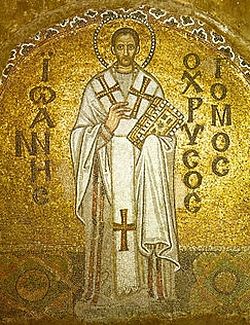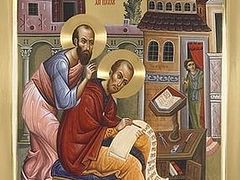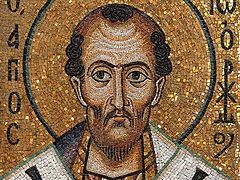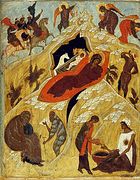
Seest
thou how they labour for the truth against their will?
For they themselves came to Pilate, themselves asked,
themselves sealed, setting the watch, so as to be
accusers, and refuters one of another. And indeed when
should they have stolen Him? on the Sabbath? And how?
for it was not lawful so much as to go out. And even if
they transgressed the law, how should they have dared,
who were so timid, to come forth? And how could they
also have been able to persuade the multitude? By
saying what? By doing what? And from what sort of zeal
could they have stood in behalf of the dead? expecting
what recompense? what requital? Seeing Him yet alive
and merely seized, they had fled; and after His death
were they likely to speak boldly in His behalf, unless
He had risen again? And how should these things be
reasonable? For that they were neither willing nor able
to feign a resurrection that did not take place, is
plain from hence. He discoursed to them of a
resurrection, and continually said, as indeed these
very men have stated, "After three days I rise
again." If therefore He rose not again, it is
quite clear that these men (having been deceived and
made enemies to an entire nation for His sake, and come
to be without home and without city) would have
abhorred Him, and would not have been willing to invest
Him with such glory; as having been deceived, and
having fallen into the utmost dangers on His account.
For that they would not even have been able, unless the
resurrection had been true, to feign it, this does not
so much as need reasoning.
For in what were they confident? In the shrewdness of
their reasonings? Nay of all men they were the most
unlearned. But in the abundance of their possessions? Nay,
they neither had staff nor shoes. But in the distinction
of their race? Nay, they were mean, and of mean ancestors.
But in the greatness of their country? Nay, they were of
obscure places. But in their own numbers? Nay, they were
not more than eleven, and they were scattered abroad. But
in their Master's promises? What kind of promises? For
if He were not risen again, neither would those be likely
to be trusted by them. And how should they endure a
frantic people. For if the chief of them endured not the
speech of a woman, keeping the door, and if all the rest
too, on seeing Him bound, were scattered abroad, how
should they have thought to run to the ends of the earth,
and plant a feigned tale of a resurrection? For if he
stood not a woman's threat, and they not so much the
sight of bonds, how were they able to stand against kings,
and rulers, and nations, where were swords, and gridirons,
and furnaces, and ten thousand deaths by day, unless they
had the benefit of the power and grace of Him who rose
again? Such miracles and so many were done, and none of
these things did the Jews regard, but crucified Him Who
had done them, and were they likely to believe these men
at their mere word about a resurrection? These things are
not, they are not so, but the might of Him Who rose again
brought them to pass.




